This post may contain affiliate links. Please read my privacy policy.
Love fried chicken? My Japanese fried chicken, or Tatsutaage, is perfect for any meal! Marinated to perfection and fried until crispy, it’s simply irresistible.
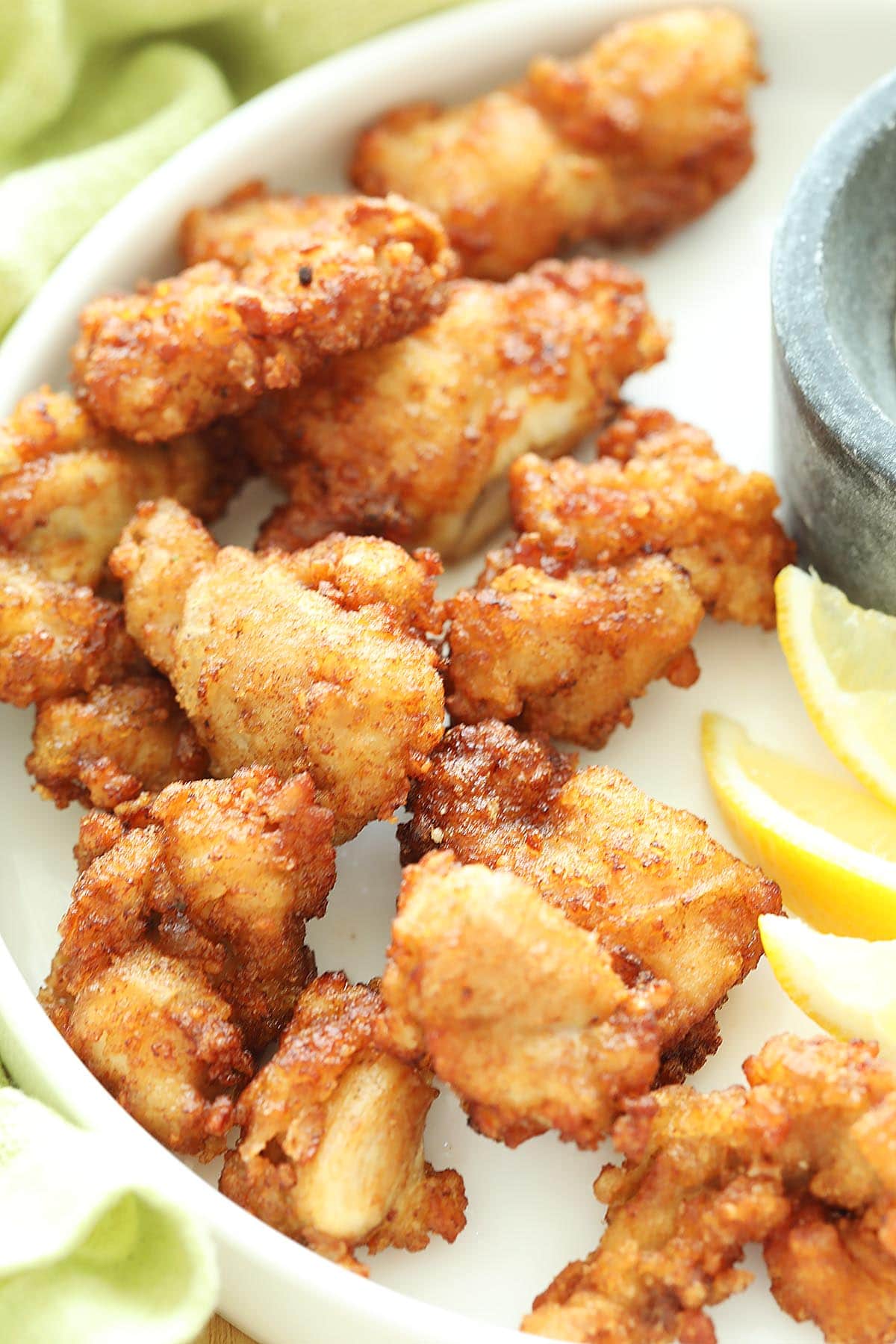
Table of Contents
Tatsutaage
Tatsutaage (竜田揚げ) is a popular style of Japanese fried chicken, similar to karaage but with distinct characteristics. Tatsutaage is named after the Tatsuta River in Nara Prefecture, famous for its beautiful red and gold autumn leaves. The golden-brown color of the fried chicken resembles these leaves, giving the dish a poetic and appealing cultural connection.
Picture bite-sized pieces of chicken, marinated in a mixture of soy sauce and ginger, then evenly coated in potato starch. These pieces are fried to a light, crisp finish with a subtly frosted look. The result is a dish that is not only flavorful but also visually appealing, reflecting the artistry often found in Japanese cuisine.
Tatsutaage is a versatile dish enjoyed in many settings. It’s popular in Japanese homes, often served with rice and vegetables, and is also a favorite at casual Japanese restaurants and izakayas. Its ability to remain crispy even when cool makes it perfect for bento boxes. In general, Tatsutaage is a lighter version of Japanese fried chicken, and it’s absolutely delightful and delicious!
In many Asian countries especially Taiwan, a similar street snack called is Taiwanese salt and pepper chicken or Taiwanese popcorn chicken.
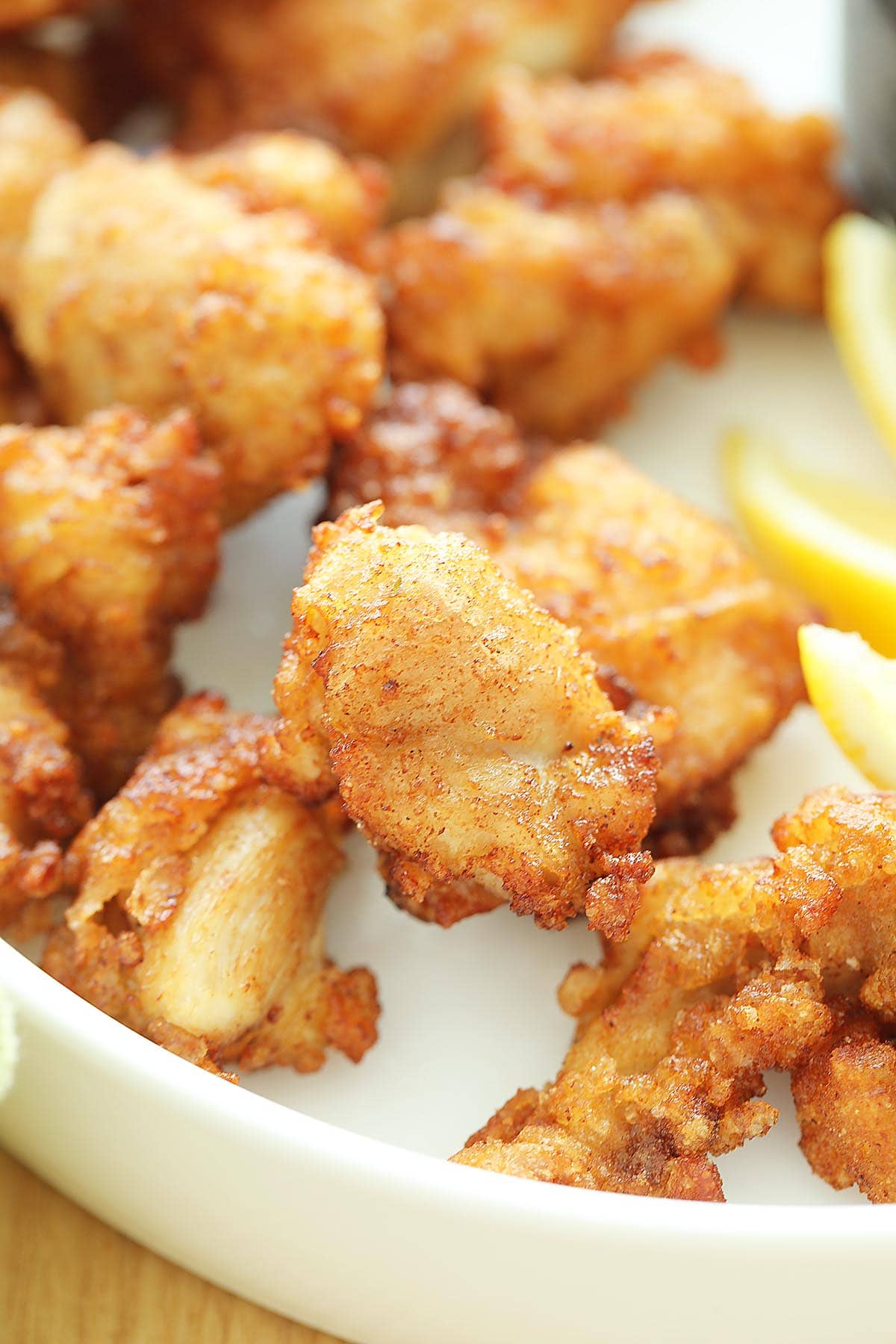
Difference Between Tatsutaage And Karaage
Tatsutaage and karaage are both Japanese fried chicken dishes but differ in key aspects. Tatsutaage is coated solely in potato starch, giving it a lighter, more delicate crust compared to karaage, which uses a combination of cornstarch for the coating.
The marinade for tatsutaage highlights the subtle flavors of soy sauce, ginger, sake and mirin, while karaage calls for sesame oil, and hence it’s sometimes called sesame fried chicken. This difference in coating and marinade results in tatsutaage having a lighter, crispier texture, whereas karaage tends to have a slightly thicker and chewier crust due to the coating.
Why You’ll Love This Recipe
- Authentic flavor. This recipe delivers that genuine Japanese taste right at home. The marinade and frying technique give you the real deal, just like in Japanese restaurants.
- Foolproof recipe. With just 2 simple steps, this recipe is a breeze and perfect for beginners. It guarantees crispy, delicious chicken that’s crunchy on the outside and juicy on the inside. You’ll get perfect results every time!
- Quick prep time. Despite its rich flavor, this recipe doesn’t take long to make. It’s perfect for those busy days when you crave for fried chicken.
- Great anytime of the day. The chicken stays crispy even when cooled, making it an easy and tasty option for lunches or snacks throughout the day!
Ingredients
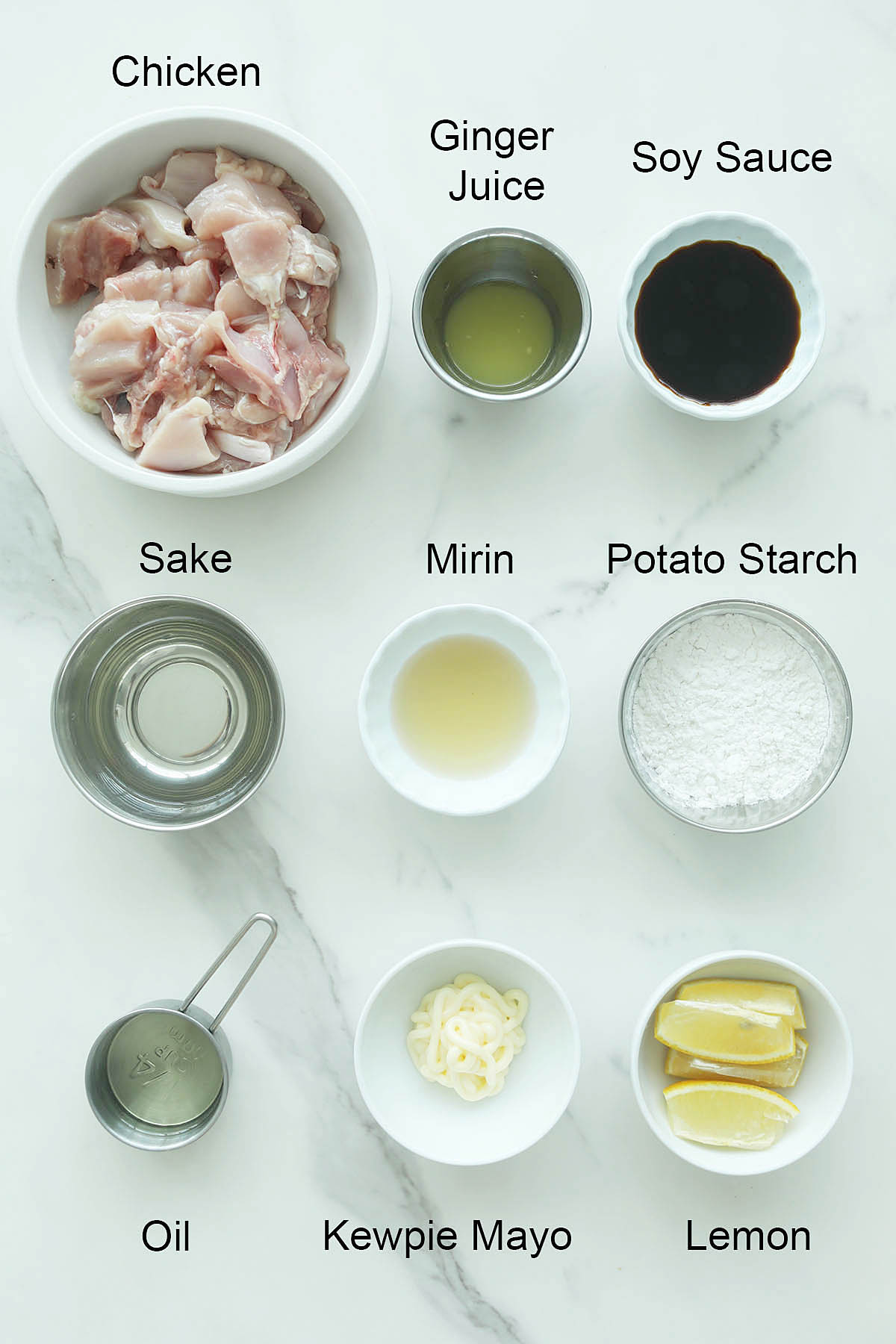
- Boneless and skinless chicken breasts or thighs – You can use either breasts or thighs, but I prefer thighs since they are a bit juicier and tastier.
- Ginger juice – Adds a fresh, zesty kick to the marinade.
- Soy sauce – Adds a salty, umami punch to the marinade, making the chicken savory and delicious.
- Japanese cooking sake – Helps tenderize the chicken and lends a nice aroma.
- Japanese mirin- Adds a touch of sweetness.
- Potato starch (katakuriko) – Makes the crust super crispy and light. If you can’t find potato starch, you can use cornstarch as a substitute.
- Lemon wedges – Serve these on the side to squeeze over the chicken for a fresh, tangy burst of flavor.
- Kewpie mayo – Used for the dipping sauce, this Japanese mayo is rich, creamy, and slightly sweet.
See the recipe card for full information on ingredients.
How To Make Japanese Fried Chicken
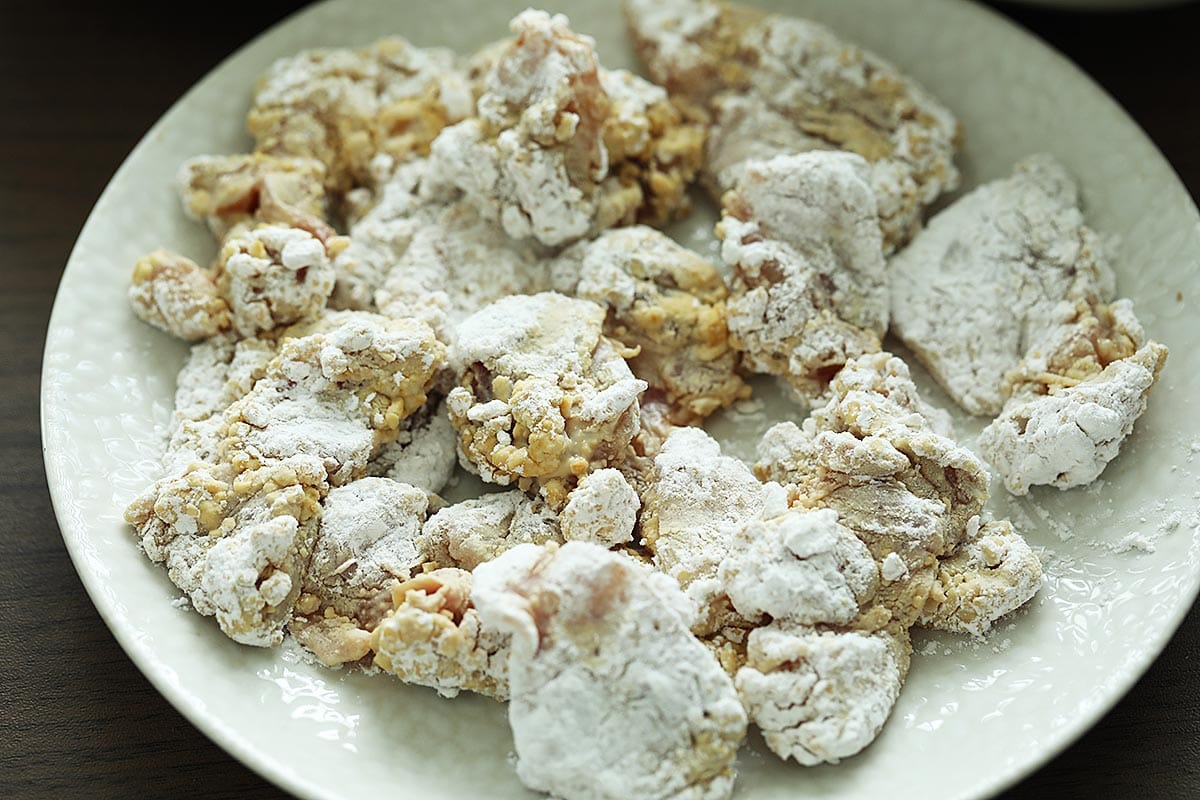
Step 1: Use paper towels to pat dry the chicken pieces and transfer them to a bowl. Add ginger juice, soy sauce, sake, and mirin, then marinate for 30 minutes. Remove the chicken pieces from the marinade and coat them evenly with potato starch. Shake off any excess starch.
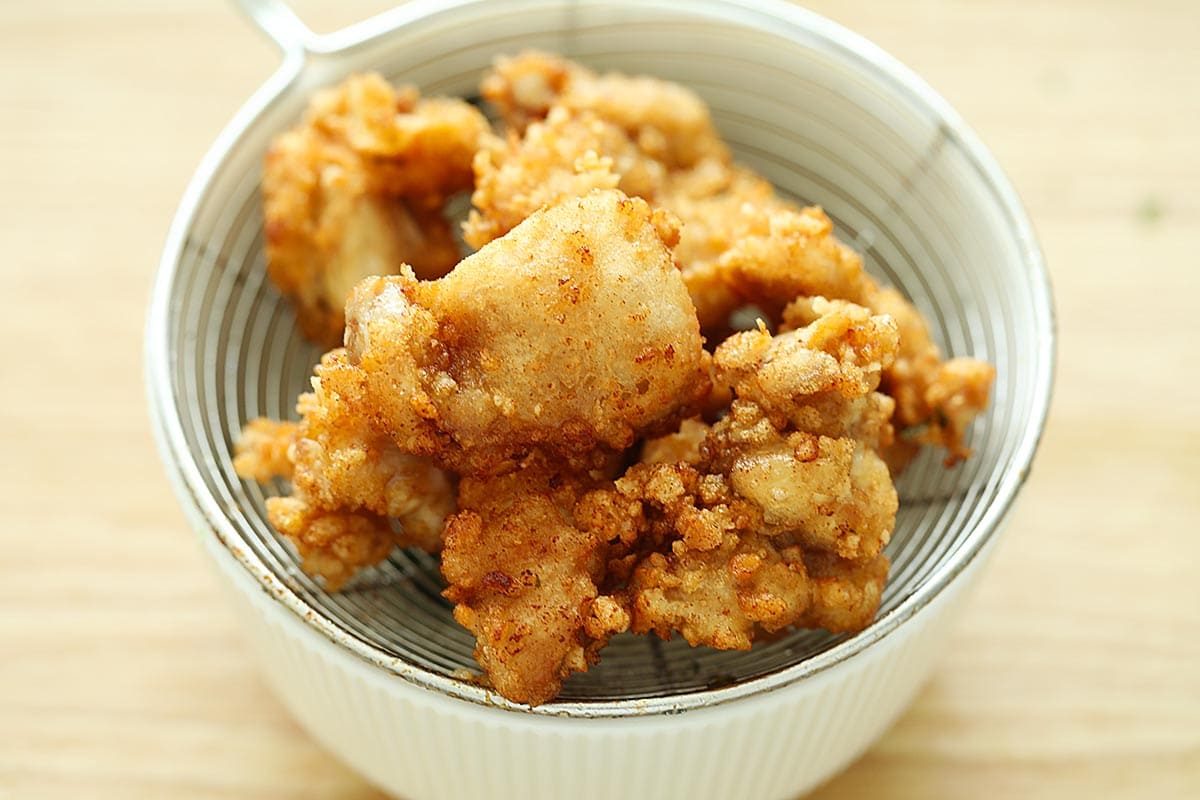
Step 2: Heat a wok or pot with cooking oil. Once the oil is hot enough for frying, add the chicken pieces and deep-fry them until they turn golden brown. Remove the chicken using a strainer. Serve immediately with Kewpie mayonnaise and lemon wedges.
Helpful Tips For Home Cooks
- Make sure to pat the chicken pieces dry with paper towels before marinating. This helps the marinade stick better and ensures a crispier coating.
- Be patient and allow the chicken to marinate for the full 30 minutes. This helps the flavors penetrate deeply into the meat, making it more flavorful.
- Heat the oil to the right temperature before adding the chicken. If the oil isn’t hot enough, the chicken will soak up too much oil and end up greasy. To check if the oil is ready, drop a small piece of bread into it—if the bread browns in about 30 seconds, you’re good to go!
- Fry the chicken in batches if needed. Don’t crowd the pan, or the oil temperature will drop, and your chicken might turn out soggy.
- For the best results, use a kitchen thermometer to keep the oil at about 350°F (175°C). This helps make sure your chicken cooks through and gets that crispy, golden exterior.
How To Serve Japanese Fried Chicken
This dish is frequently garnished with lemon slices, often paired with ponzu, mayonnaise and other dipping sauces.
They are often served as part of a meal, in bento boxes, or as a popular izakaya (Japanese pub) dish.
Dipping Sauce For This Recipe
Here are some common dipping sauces for Tatsutaage:
- Ponzu Sauce: A tangy sauce made from soy sauce and citrus juice.
- Japanese Mayonnaise or Kewpie: Adds a creamy texture with a hint of tanginess. You may add a bit of white miso for enhanced flavor.
- Soy Sauce: Can be used alone or with a squeeze of lemon juice for added flavor.
- Tonkatsu Sauce: Sweet and tangy, similar to Worcestershire sauce.
These sauces complement the crispy Japanese fried chicken by providing different flavors and textures for dipping.
Frequently Asked Questions
Use a neutral oil with a high smoke point, like vegetable oil or canola oil, for frying.
If the chicken pieces are sticking together, make sure they’re evenly coated with starch and not packed too tight in the pan. You can also gently separate them with tongs before frying.
Yes. Lightly coat the chicken pieces with oil and air fry at 375°F (190°C) for a similar crispy result.
Store leftovers in an airtight container in the refrigerator for up to 3 days.
This recipe has 380 calories per serving.
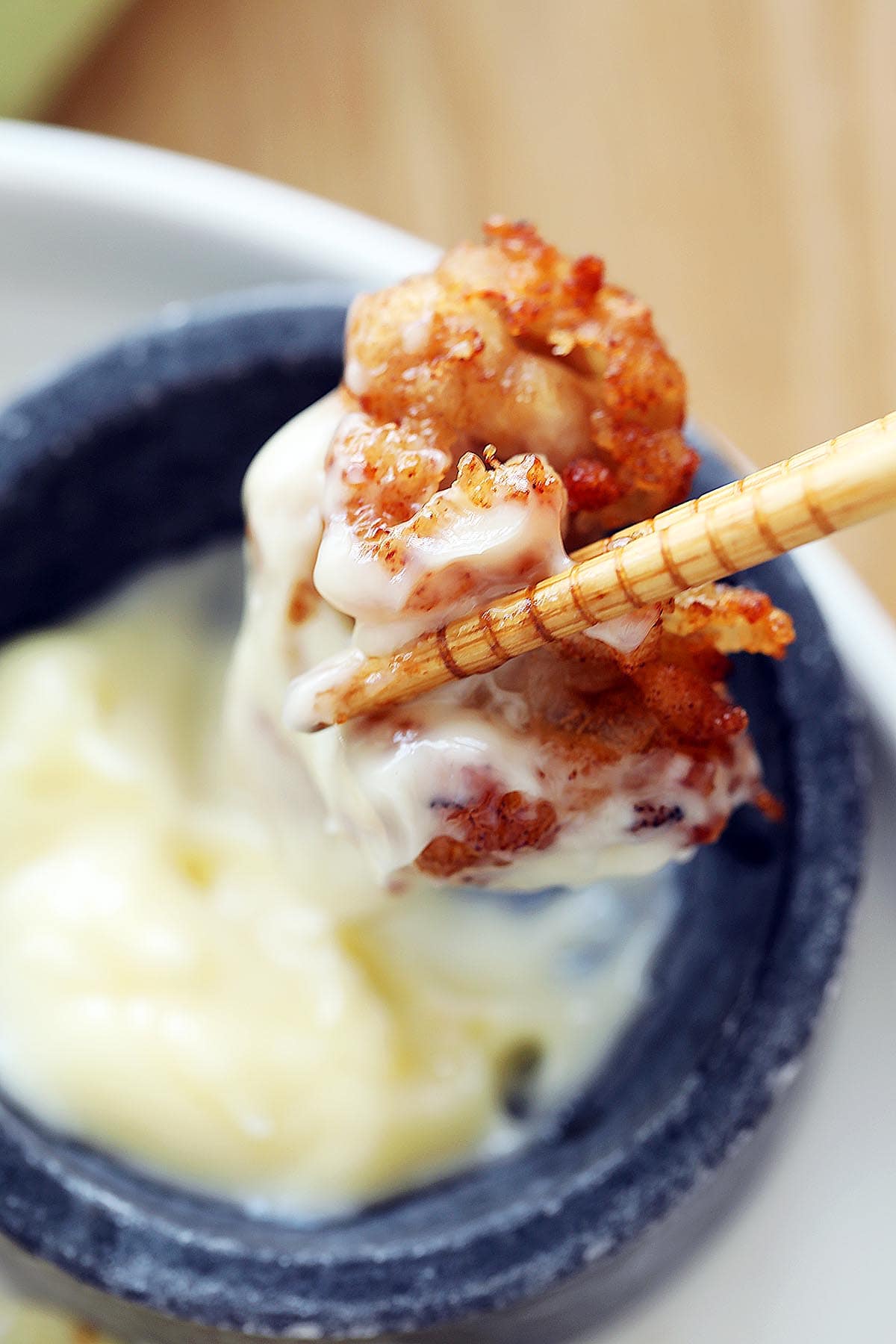
What To Serve With This Recipe
For an izakaya style Japanese meal at home, pair it with the following dishes:
I hope you enjoy this post as much as I do. If you try my recipe, please leave a comment and consider giving it a 5-star rating. For more easy and delicious recipes, explore my Recipe Index, and stay updated by subscribing to my newsletter and following me on Facebook, Pinterest, and Instagram for new updates.
Other Recipes You Might Like
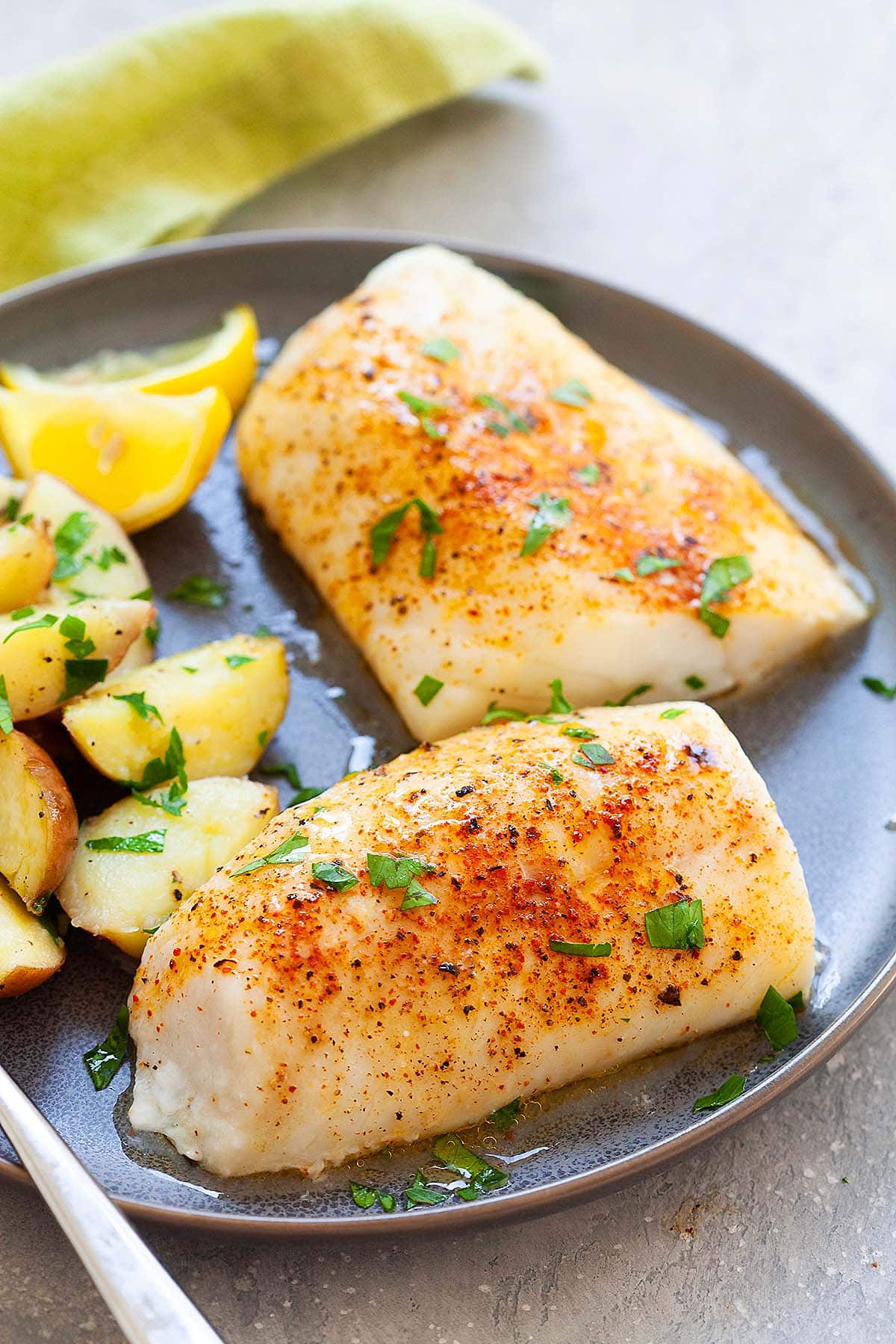
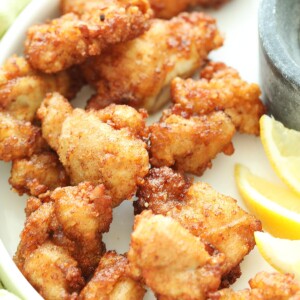
Japanese Fried Chicken
Ingredients
- 1 lb (500g) boneless and skinless chicken breasts , or thighs, cut into cubes
- 3 inches ginger, peeled and grated (extract 2 tablespoons ginger juice)
- 3 tablespoons Japanese soy sauce
- 1/3 cup (6 tablespoons) Japanese cooking sake
- 2 tablespoons Japanese mirin
- 1 cup potato starch, for coating
- cooking oil, for deep frying
- 2 tablespoons Kewpie brand mayonnaise, or regular mayonnaise
- lemon wedges
Instructions
- Use paper towels to pat dry the chicken pieces and transfer them to a bowl. Add ginger juice, soy sauce, sake, and mirin, then marinate for 30 minutes. Remove the chicken pieces from the marinade and coat them evenly with potato starch. Shake off any excess starch.
- Heat a wok or pot with cooking oil. Once the oil is hot enough for frying, add the chicken pieces and deep-fry them until they turn golden brown. Remove the chicken using a strainer. Serve immediately with Kewpie mayonnaise and lemon wedges.
Video
Notes
- Make sure to pat the chicken pieces dry with paper towels before marinating. This helps the marinade stick better and ensures a crispier coating.
- Be patient and allow the chicken to marinate for the full 30 minutes. This helps the flavors penetrate deeply into the meat, making it more flavorful.
- Heat the oil to the right temperature before adding the chicken. If the oil isn’t hot enough, the chicken will soak up too much oil and end up greasy. To check if the oil is ready, drop a small piece of bread into it—if the bread browns in about 30 seconds, you’re good to go!
- Fry the chicken in batches if needed. Don’t crowd the pan, or the oil temperature will drop, and your chicken might turn out soggy.
- For the best results, use a kitchen thermometer to keep the oil at about 350°F (175°C). This helps make sure your chicken cooks through and gets that crispy, golden exterior.
Nutrition
Nutrition information is automatically calculated, so should only be used as an approximation.
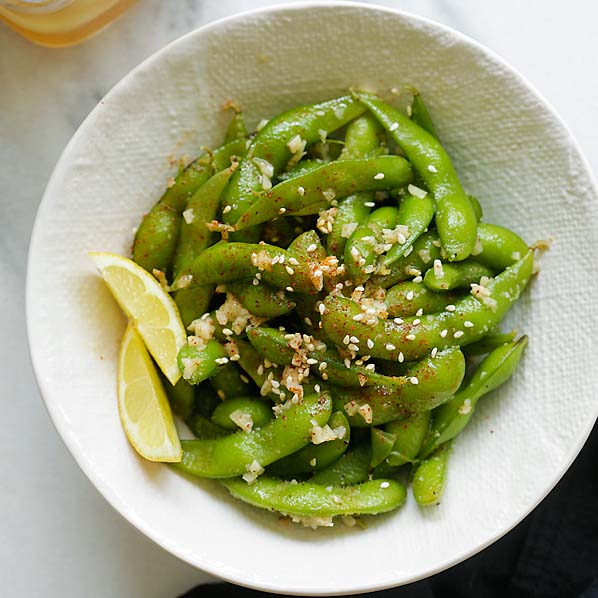
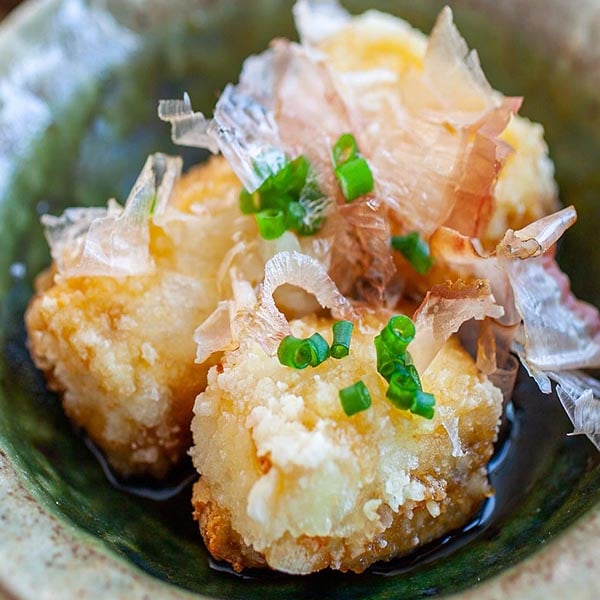
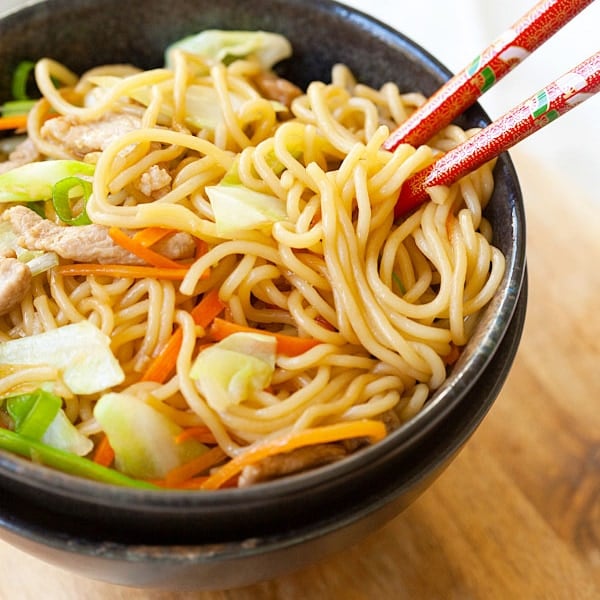
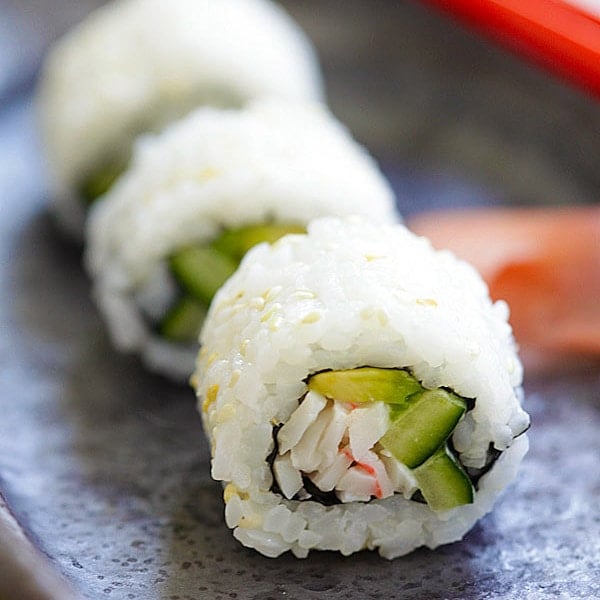






As you said, Katsu is breaded chicken, but it is first dipped in egg (and sometimes flour before that) so that the breading adheres to the chicken. No egg is used when making karaage.
The sake gives it flavor, but you can leave it out all together if you want! Great recipe!
What can I use in place of the sake?
Rice wine.
Thanks. Good recipe. Karaage chicken is my favourite style of fried chicken. I like to have plum sauce mayonnaise with fried chicken. Discovered that in Penang
Can use potato starch in place of the corn starch?
Yes.